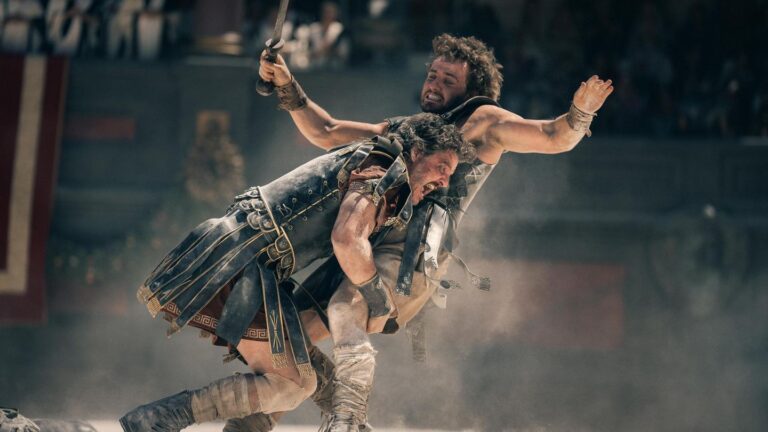In Gladiator II, Ridley Scott’s much-anticipated sequel to his thrilling 2000 epic, sixteen years have passed since Maximus Decimus Meridius gave his life for a better Rome, and the hope Maximus fought for has long since faded. The film opens in Numidia, where a skilled fighter named Hanno (Paul Mescal) leads a quiet life of relative tranquility, until Roman forces led by the ruthless General Acacius (Pedro Pascal) launch a devastating invasion. Captured and enslaved, Hanno is thrust into the brutal world of the gladiatorial games, where he must fight not only for survival but also for a chance to confront Rome’s corrupt leaders.
Sounds a bit familiar, doesn’t it? From its opening moments, Gladiator II leans heavily on echoes of the original, from the thunderous battles to the morally bankrupt rulers pulling the strings. Yet while it seeks to recapture the magic of its predecessor, the sequel struggles to step out of its shadow. Watching Gladiator II can sometimes feel like listening to a competent cover band: the notes and lyrics are familiar, but the ineffable spark that made the original so unforgettable doesn’t quite shine through.
Paul Mescal delivers a committed performance as Hanno, exuding a quiet intensity that commands attention. However, while he brings physicality and depth to the role, he lacks the charisma and gravitas Russell Crowe brought to Maximus. Hanno’s connection to the events of the first film adds a layer of intrigue, but the details of that link feel disappointingly contrived, like a first-draft idea that was never refined. Even so, Mescal shines in the film’s many action sequences, and has great chemistry with the supporting cast.
The film’s antagonists are something of a mixed bag. Denzel Washington’s Macrinus is a standout, blending charisma and theatricality into a performance that allows just the right amount of scenery-chewing while also injecting some much-needed energy into the film. At first, Macrinus feels like a spiritual successor to Oliver Reed’s Proximo, but he turns out to be far more ambitious, using his flamboyance to distract from the meticulous plotting happening behind the scenes. On the other hand, Joseph Quinn and Fred Hechinger’s twin emperors often come across as overly theatrical; an odd complaint, given a period and setting known for its theatricality, but the campiness of their performances has the unfortunate side effect of undercutting their menace. Pedro Pascal strikes a better balance, portraying Acacius as a soldier torn between duty and doubt, making for an interesting counterpoint to Hanno’s singular quest for vengeance, and Connie Nielsen (reprising her role as Lucilla) is effective in a rather thinly written role.
Ridley Scott continues his exploration of power, betrayal, and revenge, but the sequel’s narrative feels constrained by its adherence to the structure of the original. Once again, we follow a warrior betrayed and enslaved, rising through the gladiatorial ranks to confront Rome’s elite. While there are attempts to delve into moral complexity — particularly through Pedro Pascal’s Acacius, a man fighting for an empire he both serves and questions — the film often prioritizes spectacle over substance.
That spectacle is undeniably impressive. Cinematographer John Mathieson, returning from the original, captures breathtaking vistas, stunning architecture and the chaotic intensity of the arena battles with aplomb. There are few better than Scott when it comes to staging large-scale period combat, and an early naval skirmish sets the tone for a film unafraid to go big. But bigger isn’t always better, and the introduction of wildlife into the arena — including rhinos, baboons and even a shark or two (I’m not kidding) — threatens to push the spectacle into the realm of the ridiculous.
Visual grandeur notwithstanding, Gladiator II often struggles to match the emotional resonance of its predecessor. The film’s pacing doesn’t help: even at a whopping 148 minutes, scenes feel rushed, transitions are abrupt, and the story often seem to be lacking the connective tissue needed to fully immerse viewers in the emotional stakes. These complaints are similar to my criticisms of last year’s Napoleon, and I can’t help but wonder if this is another case where Scott intends to deliver a longer director’s cut as he did with that film, and (more successfully) with Kingdom of Heaven.
Despite these shortcomings, Gladiator II remains entertaining as a “sword and sandals” spectacle, a genre for which I have much affection. The arena battles, while sometimes veering into absurdity, remain undeniably thrilling, and the performances — particularly from Washington and Mescal — are strong enough to carry the film through its weaker moments. For fans of the original, the nostalgic callbacks and epic set pieces may be enough to satisfy, even if this sequel rarely achieves the soul-stirring impact of its predecessor.

